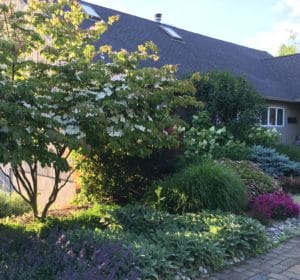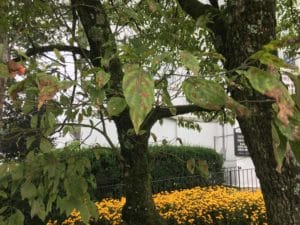Hello, fellow readers,
Anthracnose (Ann-thrack-nose, my phonetics) is the most discussed and severe among the doggone dogwood dilemmas. Though powdery mildew, leaf and flower blight spots and crown cankers also rank high. Never mind the dogwood borer, which can run amuck.
Discula destructiva, a fungal pathogen, causes dogwood anthracnose. You don’t need to know Latin to know what that means – it’s destructive. In fact, deadly over time, which is why the much-loved native dogwood (Cornus florida) is no longer thriving along woodlines where they love to live. And, as far as I’ve seen, the pure species are long gone from nurseries. However, there are a few varieties (native plant purists would call Native-ars) that show some resistance, such as ‘Cherokee Sunset’ and ‘Spring Grove.’
Symptoms start with brown spots on leaves, up to a quarter-inch, that often progress to the tips of leaves, becoming blotched with brown dead tissue. The lower branches begin to die on which acne seems to appear – pimply red bumps, which are the fungus’ fruiting parts. When in bloom, the bracts can be spotty, which is pretty, like reddish freckles, until the spots turn brown and distort the bracts. As you would guess, since it’s a fungus, humid, soggy summer conditions like ours have exasperated the dilemma.
What to do? Rake and destroy fallen leaves, but don’t remove the diseased limbs until the tree is dormant. During the growing season, note the infected branches and prune them out in late fall or winter. Then, in spring, you can apply a fungicide to protect the flowers, leaves, and stems during budding. Reaching the high parts and spraying every two weeks until the leaves are fully developed is challenging. It may be best to hire a high-reaching professional.
Sadly, even with treatments, many trees die. You can replace dying trees with a hybrid of Kousa Dogwood (Cornus kousa, the hardier Asian species) and our native Flowering Dogwood (Cornus florida). Rutgers University has been a pioneer in this hybrid led by Dr. Elwin Orton. He brought to market the Stellar series of dogwoods in 1990, including Cornus’ Rutgan’ Steller Pink, Ruth Ellen, and Constellation. All are resistant to dogwood diseases, including Anthracnose and powdery mildew.
However, the form of the Steller series of dogwoods is more vase-shaped than the much-loved broad-reaching canopy of the Flowering Dogwood. Still, they are magnificent trees. It took Orton a quarter of a century to breed, evaluate, and improve the hybrid before bringing it to market. It takes that long to tackle the fungus amongst us with such beauty and grace.
Garden Dilemmas? AskMaryStone@gmail.com and your favorite Podcast App.
Column updated 11/12/23
There’s more to the story in the Garden Dilemmas Podcast:

Cornus Kousa in its glory at a client’s home in Fredon, NJ. You can read about another Kousa beauty in Avis Campbell Gardens Wheel of Life.



